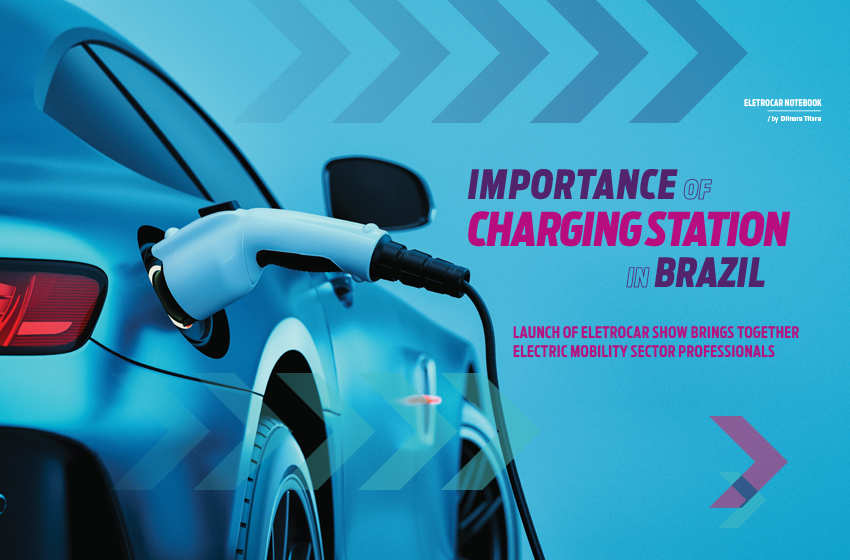
Eletrocar Notebook – Importance of charging stations in Brazil
Launch of Eletrocar Show brings together electric mobility sector professionals
The Eletrocar Notebook continues its mission to address the future of electric mobility in every edition of Eletrolar News Magazine, connecting leading brands, manufacturers, and buyers in this rapidly expanding segment. The Grupo Eletrolar All Connected supports the development of sustainable mobility in Brazil.
By Dilnara Titara

On September 25, the group took an important step towards the future of electric mobility in Brazil with the launching event for Eletrocar Show, which will take place alongside the 18th Eletrolar Show from June 23 to 26, 2025, at the Distrito Anhembi (SP). The electric mobility fair will feature lectures, brand exhibitions, and test drives, with the presence of manufacturers of heavy, light, and ultra-light vehicles, as well as brands offering components, infrastructure, and electric mobility solutions.
Eletrocar Show emerges at a crucial moment for the growth of the electric vehicle sector in Brazil. Automotive professionals and entrepreneurs will learn about the innovations shaping the future of sustainable mobility. Carlos Clur, president at Grupo Eletrolar All Connected, states that the idea is to discuss the experiences of other countries and see how they can be applied here. “We want to provide the public with the experience of driving an electric vehicle, which is economical, viable, and essential for sustainability.”

Charging Infrastructure
In the realm of electric mobility, chargers are essential for electric vehicles and serve as the foundation for their popularization. Without a robust charging network, mass adoption faces limitations. EZVOLT is one of the pioneers in creating and implementing this infrastructure in Brazil. “We have a vast network of AC chargers, both for fleet use and residential use in condominiums, as well as charging stations with fast and ultra-fast chargers,” says Rodrigo de Almeida, CRO (chief relationship officer) of the company.
“We want to provide the public with the experience of driving an electric vehicle, which is economical, viable, and essential for sustainability.”
EZVOLT was the first to offer paid energy via an app, with the development of the Easy Volt app, which quickly gained high adoption, reaching 40,000 users in no time. The growth has been consistent. Vibra Energia invested in the company, enabling it to innovate and create the first charging hub in the Anália Franco neighborhood of São Paulo, which now charges about 400 cars per day. Fleets of major companies, such as JBS and Mercado Livre, have adopted the service, which has expanded into the B2B market.
Today, the company is beginning to electrify airports. This year, it closed a contract to electrify ships at the ports of Santos and Rio de Janeiro. In the market for five years, it has brought various solutions to the country. For electric bus fleets, it developed a charging management system with queue control to optimize the charging time of the fleet. The Plug and Charge system is currently being tested, allowing users to simply connect the charger to the vehicle, which identifies the chassis number (also known as VIN Number). If it is registered and authorized for network use, charging starts automatically without needing to scan a QR Code.
Challenges

Although the number of electric vehicles is growing, the expansion of charging infrastructure often depends on partnerships with governments, energy companies, and manufacturers of these cars. The high cost of installing charging stations, the lack of standardization of chargers, and the scarcity of charging points in remote areas present challenges. The absence of robust government incentives and clear regulations limits progress.
“Our goal for the next five years is to have 5,000 charging stations.”
The electric charging sector has evolved rapidly, but there are still bottlenecks for new implementations. Rodrigo says that today, the biggest challenge is identifying suitable locations for installing charging stations with sufficient electrical infrastructure to support charger loads. Regarding AC chargers, the challenge occurs in residential condominiums due to a lack of shared parking spaces.
Sustainability and Energy Efficiency
The adoption of electric vehicles is significant in various aspects, especially regarding reducing greenhouse gas emissions and dependence on fossil fuels. However, challenges remain, such as the extraction of lithium, cobalt, and other materials used in batteries. The penetration of renewable energy-based charging infrastructure in the country also brings various benefits and a direct impact on sustainability.
The EZVOLT charging point in Rio de Janeiro, which is about to be inaugurated, will have the first ultra-fast charger in the country with a Battery Energy Storage System (BESS), which complements the power received from the grid and can deliver more power than just the available electrical grid. The charger with BESS has a coupled battery bank and uses the power coming from the battery, reducing the energy consumption from the grid.
As a company that received investment from Vibra Energia, EZVOLT has been able to purchase energy from COMERC — the largest energy trader in the free market, which belongs to the Vibra group — from renewable sources with certified origins, highlights Rodrigo. “We have a project for generating carbon credits in the regulated market through fleet substitution (from combustion to electric). This way, companies looking to invest in electric vehicle fleets can have certified and audited access to carbon credits.”

Expectations

More electric vehicles on the road mean greater demand for charging stations. “We expect to double the number of charging points and hubs we have throughout 2025, as well as significantly increase our presence in residential condominiums. Our goal for the next five years is to have 5,000 charging stations,” says Rodrigo.
“Eletrocar Show 2025 arrives in the Brazilian market at the right time.”
To make Eletrocar Show an even more robust event, the Grupo Eletrolar All Connected has partnered with Juan Pablo de Vera, former director of the Salão do Automóvel (Auto Show), who brings over two decades of experience in the automotive sector. This collaboration strengthens the initiative and promises an event that will be a meeting point for key players in the market. “Eletrocar Show 2025 arrives in the Brazilian market at the right time,” says Juan Pablo, president of the event.

Juan Pablo emphasizes that, just as in other countries, Brazil is experiencing a unique moment with a growing supply of quality products and services. This scenario opens opportunities for companies interested in investing in the country. They will find fertile ground to develop networks of distributors and business partners. “That’s why we believe Eletrocar Show will be the great showcase of the sector. The event will allow brands to consolidate their positions in the market and increase visibility among professionals leading the transition to electric mobility.”
Source: Eletrolar News Magazine ed. 163





